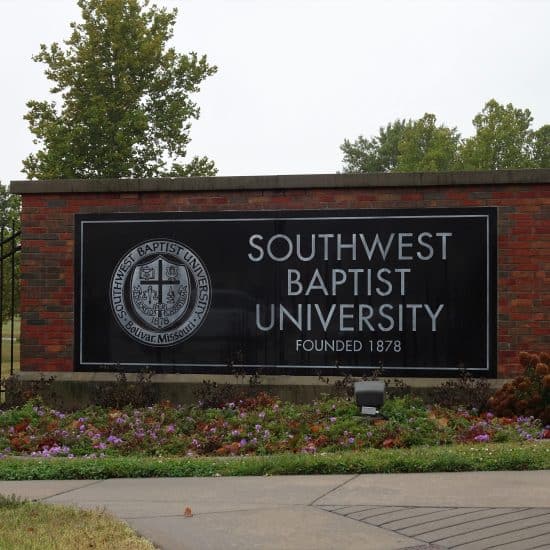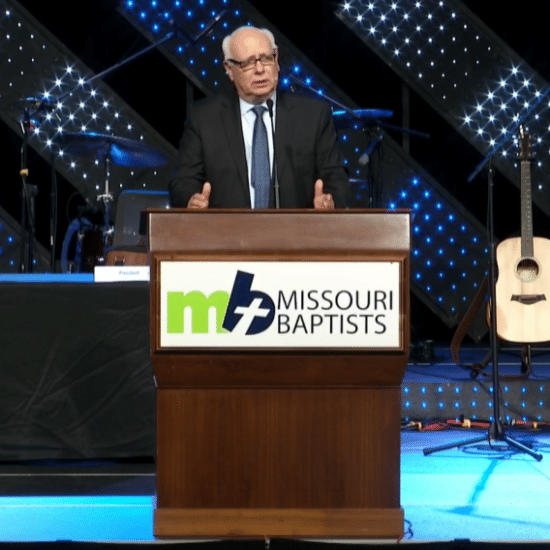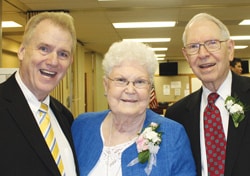
Professors in the Redford College of Theology and Ministry at Southwest Baptist University in Bolivar, Missouri, will be required to affirm three additional statements — beyond the Baptist Faith & Message of 2000 — if they wish to keep their jobs. The three statements are the 1978 Chicago Statement on Biblical Inerrancy, the 1988 Danvers Statement on Biblical Manhood and Womanhood, and the 2017 Nashville Statement on sexuality.
The requirement is the latest move in a nearly two-year controversy at the school. In November 2018, SBU fired Clint Bass, a Redford professor, for violating SBU’s faculty handbook. Bass had met secretly with Missouri Baptist Convention leaders in an effort to allegedly drive out other theology professors. A trustee committee upheld his dismissal.

Social distancing and mask signs at Southwest Baptist University in Bolivar, Missouri. (Brian Kaylor/Word&Way)
As the controversy continued throughout 2019, the head of Redford left to pastor a church in Arkansas after facing months of what he called “lies” and “malicious attacks” from Bass and others. The SBU Board of Trustees removed one of its own members for violating the Board’s conflict of interest policy. The MBC criticized that move as illegitimate. Then ahead of the MBC’s annual meeting last October, the MBC deviated from standard practice and replaced SBU’s entire slate of trustees to put five new individuals on the Board. It marked the second year in a row that SBU saw some of its nominated trustees unilaterally replaced by the MBC’s Nominating Committee.
A key issue that emerged during the controversy involved the Baptist Faith & Message of 2000. Bass criticized several of his former colleagues for attending churches that haven’t adopted that confessional statement passed by the Southern Baptist Convention’s messengers under the presidency of Paige Patterson (who in 2018 was fired by Southwestern Baptist Theological Seminary in Fort Worth, Texas, for mishandling allegations of student rapes). Most of those attacked attend First Baptist Church in Bolivar, which has adopted the Baptist Faith & Message of 1963.
As the controversy grew, Redford professors were required to affirm the BF&M 2000, and SBU’s trustees also affirmed the statement. The MBC now requires any church desiring to affiliate to officially adopt the BF&M 2000. Although existing churches were grandfathered in from that rule, some of the SBU-nominated trustees rejected by the Nominating Committee were told it was because their church hadn’t adopted the BF&M 2000 — even though MBC’s documents only require personal affirmation by the nominee and not a congregational vote.
For much of 2020, the disagreements between the MBC and SBU have been mostly behind closed doors as leaders and lawyers discuss governance changes the MBC is demanding of the institution, such as affirming the BF&M 2000 and granting the MBC stronger legal authority over the institution.
Additional Statements Required
With the new academic year just starting, negotiations between the two camps still underway, and the 2020 MBC annual meeting coming next month, a new requirement was imposed on Redford faculty that they affirm three additional statements. The demand echoes the shift from a confessional to a creedal culture in recent years at some SBC seminaries that have increased the number of statements faculty must affirm.
When asked by Word&Way about the new requirement for Redford professors, SBU responded: “Our board has sent the governance documents to the Convention for review. We are now working together on the finer points.”
The Chicago Statement on Biblical Inerrancy emerged from a 1978 conference held by the International Council on Biblical Inerrancy to defend the Bible as without error. While the influential statement defines and explains inerrancy, the preface explicitly rejects making it a creedal statement and invites people to offer edits based on disagreements.
“We acknowledge the limitations of a document prepared in a brief, intensive conference and do not propose that this Statement be given creedal weight,” they drafters wrote. “We invite response to this statement from any who see reason to amend its affirmations about Scripture by the light of Scripture itself, under whose infallible authority we stand as we speak. We claim no personal infallibility for the witness we bear, and for any help which enables us to strengthen this testimony to God’s word we shall be grateful.”
The other two statements were both crafted by the Council on Biblical Manhood and Womanhood. The group formed in 1987 to promote a “complementarian” view of gender that defines men and women as holding complementary but different roles in marriage, family, and churches. Those espousing this perspective restrict women from many ministry roles and insist on male leadership in families. The alternative perspective of “egalitarianism” argues women and men are created equal.
The Danvers Statement of 1988 focuses on defining roles for men and women according to complementarianism. The Nashville Statement of 2017 focuses on issues of sexuality as it condemns homosexuality, transgender identity, and sexual activity outside of marriage.
A few state Southern Baptist conventions — though not the MBC — passed resolutions in 2017 affirming the Nashville Statement, including the Arkansas Baptist State Convention that called the Statement “without error in its declarations based on biblical truths.” However, Mark Galli, then-editor in chief of the conservative Christianity Today, argued the statement was flawed.
“Unfortunately, in attempting to clarify classic orthodox belief, the Nashville Statement ended up confusing some issues and has divided advocates of biblical sexuality,” he wrote in October 2017. “This is in part because it was largely driven by the Council on Biblical Manhood and Womanhood (although the group had conversations with other organizations) and lacked broader participation, failing to garner a consensus among those most deeply sympathetic to its main affirmations.”
Gali argued that “public pressure to sign or abstain” from statements like the Nashville one actually “undermines their greatest value.” Pointing to the preamble of the Chicago Statement that invites responses, he recommended his fellow members “in the evangelical community approach these documents with the same humility and patience.”
“Unfortunately, some are already using the untested Nashville Statement to determine others’ orthodoxy or as a requirement to join their organization,” he added.






